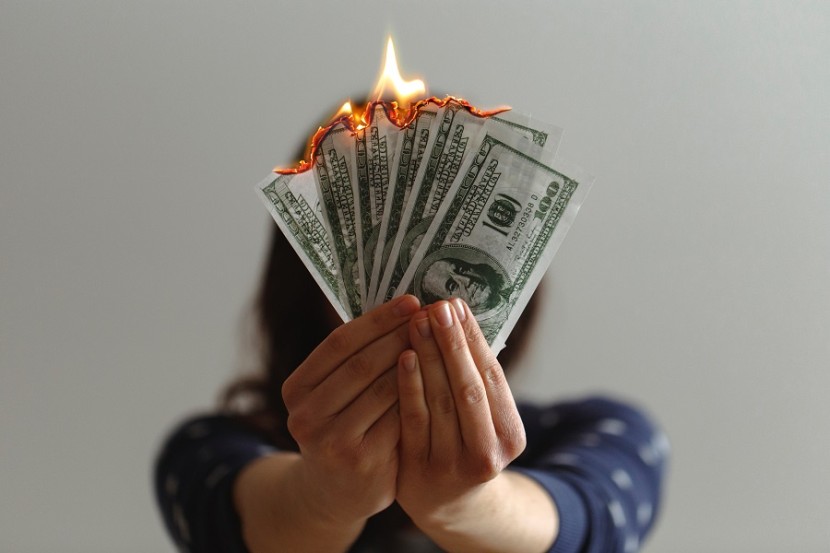
Since the beginning of the Covid-19 pandemic, there have been three waves of stimulus payments. However, as of now, neither the White House nor Congress has authorized a fourth round of stimulus checks; and it is unclear if they will approve a fourth round of stimulus checks in the future.
That hasn't stopped rumors from spreading on social media about the federal government issuing a fourth stimulus check, especially a $2,500 payment on July 30. On July 15, a false social media post on Facebook promised that everyone would get $2,500 in stimulus money by July 30. A link to a post that tells you what you need to do to get yours immediately deposited, how to receive it faster, and how to monitor it, is provided at the end of the post.
Per The Sun, the message then links to a page that purports to explain how to have checks "directly deposited" but leads to a picture of an ape giving people the middle finger. The terrible prank comes at a time when millions of Americans are appealing with Congress for a fourth stimulus check.
The White House, on the other hand, has not stated whether or not a fresh batch would be released. Since the beginning of the pandemic, three stimulus checks have been issued: one in March 2020 for $1,200, one in December 2020 for $600, and a third for $1,400. The last stimulus check was passed under the $1.9 trillion American Rescue Plan Act, which also provided more money to families with children than the previous two stimulus checks.
However, there is a chance that the White House may enact a fourth stimulus package after all. In June, White House Press Secretary Jen Psaki said the president is "open to a range of ideas" about a fourth check and hasn't ruled it out. However, as the country recovers from Covid-19 and begins to reopen, there appears to be little chance that a fourth stimulus check will be made.
If not a fourth stimulus check, what should you wait for instead?
Members of Congress have authorized the third batch of relief payments, which are already being distributed. President Joe Biden signed this measure into law in March of 2021. Almost all of the stimulus payments have now been distributed. The overall cost of all of these payments is $400 billion. This package includes your stimulus check.
According to the IRS's notice on Wednesday, about 2.2 million further stimulus payments were already made in June and July. Around 1.3 million of these stimulus payments were intended for beneficiaries who were getting their checks for the first time. These are Americans who have not had their information entered into the IRS database.
These are the Americans who did not get a stimulus check prior to submitting their 2020 tax returns. The remaining 900,000 stimulus recipients received "plus-up" payments. Just those Americans who have gotten only partial or incomplete stimulus relief will get these payments, Digital Market News reported.
You may be entitled to a plus-up relief payment if you did not get the full amount of your stimulus payment. Because many Americans submitted their tax returns for 2020 after the stimulus checks were released in March 2021, these plus-up relief checks were provided. As a result, if a family's income has decreased, they are entitled to a larger payment. However, the IRS refused to give it to them since their 2020 tax returns had not yet been finalized.
More stimulus checks are on their way
The US government has continued to send out stimulus checks to its citizens, with 2.2 million distributed in the previous six weeks. Although this is the third round of stimulus checks, it serves as a refresher and so functions similarly to the fourth stimulus check.
These 2.2 million payments increase the overall number of payments to 171 million, with a total cost of $400 billion reported by the IRS, Treasury Department, and Bureau of the Fiscal Service. Citizens in the United States are now receiving money in the form of stimulus checks as part of the American Rescue Plan Act, which was signed into law by President Joe Biden in March.
The money that people are receiving now is referred to as plus-up payments by the IRS because some US residents could not qualify for the full $1,400 owing to their 2019 taxes but would have been able to form their 2020 return, thus this has been remedied. It is estimated that 900,000 individuals are affected. The remaining 1.3 million people, on the other hand, had not gotten any financial help via stimulus checks since the IRS was unable to contact them. But now that they have registered, they are entitled to receive funds from the US government, as per MARCA.
Related Article: Still Waiting For Your Stimulus Check? Here's What to Do to Find, Track Payments








